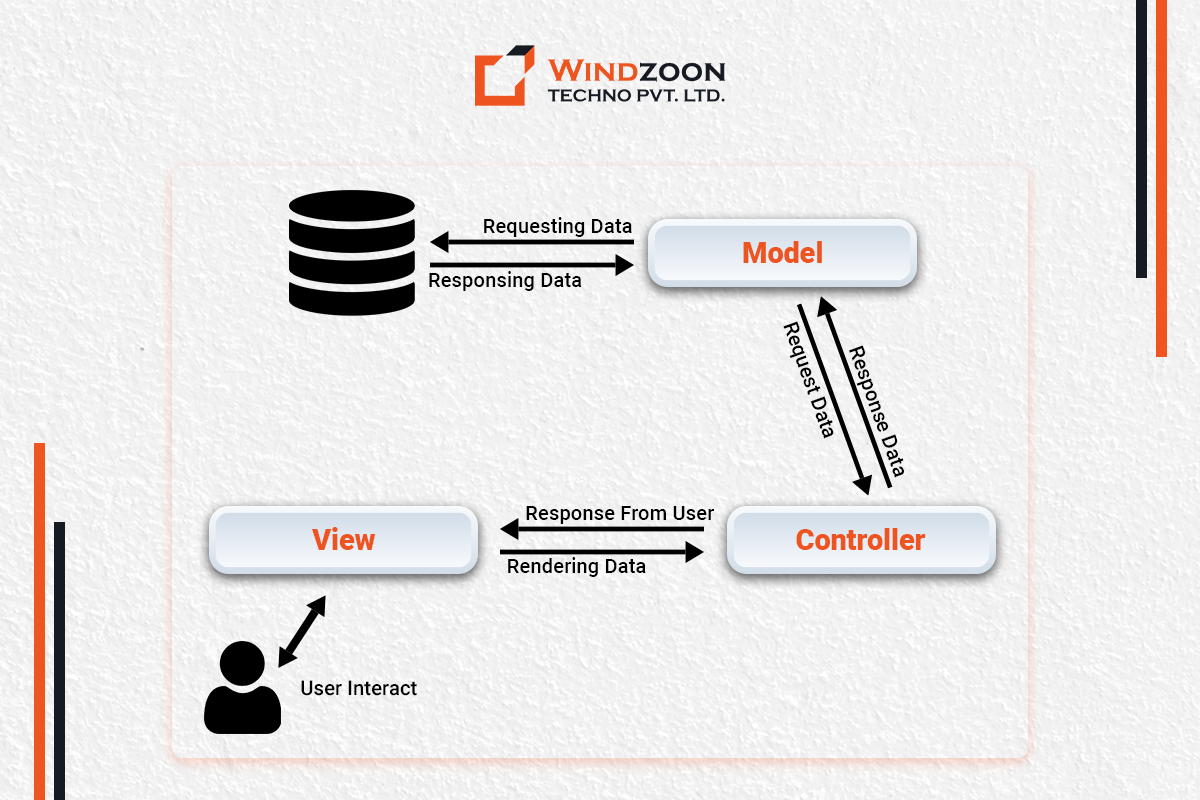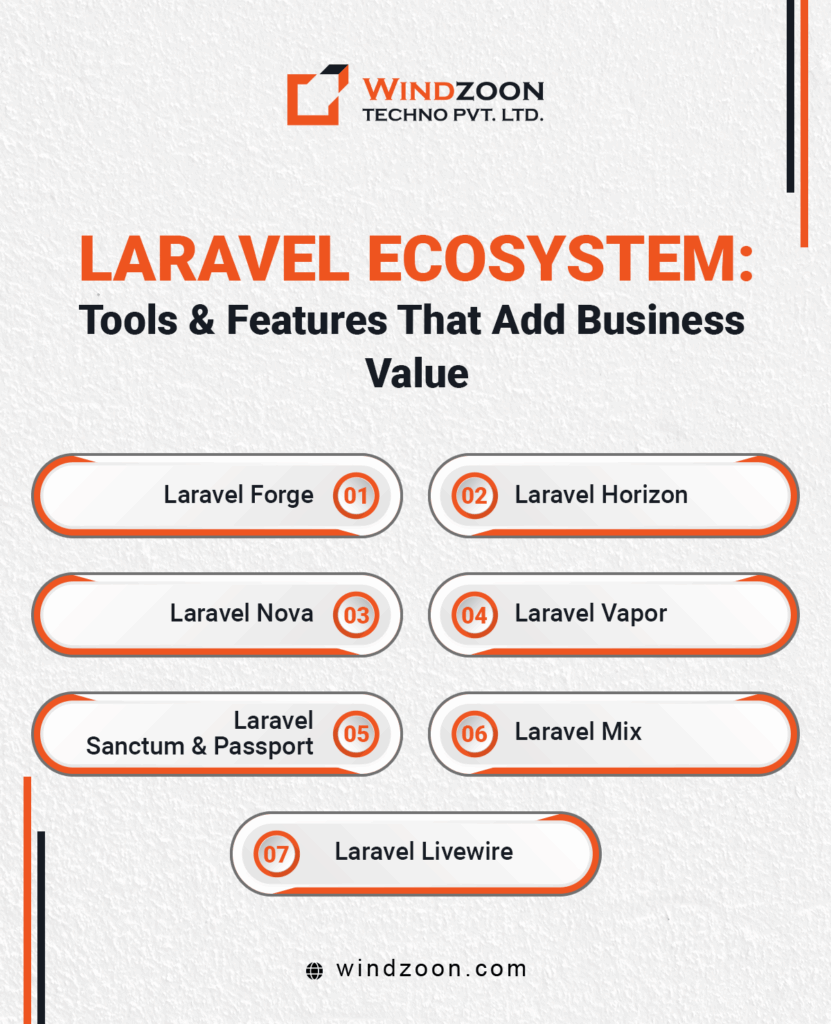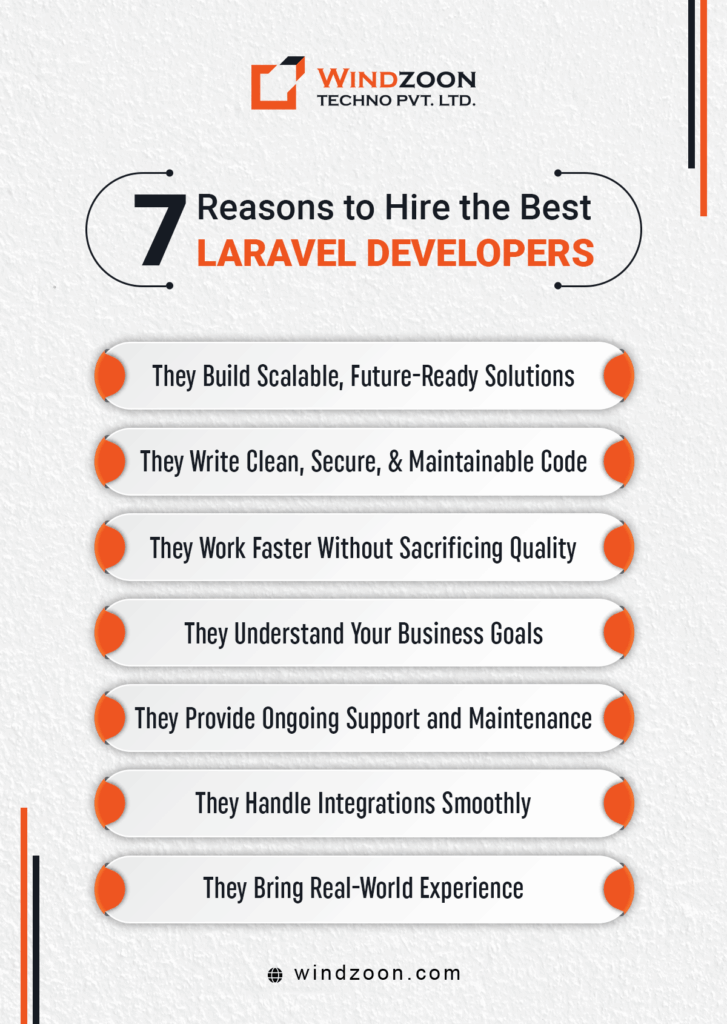In today’s digital-first world, your website or web application is often your customer’s first impression of your business. A beautifully designed platform isn’t enough if it fails to perform smoothly, load quickly, or scale as your business grows. Behind every effective web solution is not just an idea, but a smart framework and a skilled development team.
One of the most trusted frameworks used globally for web development is Laravel. But even the best tools can fall short in the hands of inexperienced developers. That’s why hiring the best Laravel developers isn’t just a technical decision – it’s a strategic business move.
Before we dive into the reasons why this matters, let’s understand Laravel better.
What Is Laravel?
Laravel is a PHP-based web development framework that helps developers build powerful, secure, and scalable web applications faster. PHP, being one of the most used server-side programming languages, forms the foundation, while Laravel builds on top of it with more structure and pre-built features.
Laravel provides developers with ready-to-use libraries, logical coding practices, and security features out of the box. Think of it like a toolkit for building modern websites and web apps efficiently. It’s like having a fully stocked kitchen; a good chef (developer) can prepare a great dish faster with the right tools, and Laravel is exactly that for web development.
How Laravel Works
Laravel follows a system called MVC: Model-View-Controller.
- Model: Manages the data and logic (like your business rules).
- View: Handles what users see on the screen (like the design and interface).
- Controller:Acts like a manager that handles requests and connects Models with Views.

This separation helps keep code clean and organized. When a user clicks a button or fills a form, Laravel uses a router to decide what should happen. It may trigger a controller, which may pull or save data via a model, and then return a result using a view. All of this happens seamlessly.
Laravel also includes tools like:
- Artisan CLI: A command-line tool to generate files quickly.
- Blade: A simple templating engine for layouts.
- Eloquent ORM: Helps interact with databases using PHP instead of raw SQL.
This makes development fast, secure, and less prone to errors.
What Sets Laravel Apart from Other Frameworks
Laravel isn’t the only PHP framework available, but it consistently ranks as one of the most preferred options for developers and businesses alike. Here’s what makes Laravel truly stand out:
1. Cleaner Syntax
Laravel is known for its elegant and readable code. This means that developers can write less code to achieve more functionality, and it becomes much easier for teams to collaborate and maintain the codebase. Cleaner syntax leads to faster onboarding for new team members and reduces the likelihood of bugs or confusion.
2. Built-In Tools and Features
Unlike many other frameworks that require external libraries or packages for common functions, Laravel includes a wide range of built-in features right out of the box. These include authentication, routing, caching, email handling, and more. This reduces setup time and helps developers build faster with confidence in Laravel’s native support.
3. Strong Community and Ecosystem
Laravel has a large, active community of developers who constantly contribute tutorials, open-source packages, and support. This strong ecosystem makes it easier for new developers to learn, get help quickly, and follow best practices. Regular updates from the community also mean that Laravel stays modern and well-maintained.
4. Focus on Security
Security is a big concern in web development, and Laravel handles this well. It includes built-in tools to protect against major threats like CSRF (Cross-Site Request Forgery), XSS (Cross-Site Scripting), and SQL Injection. Developers can use Laravel’s secure authentication system with minimal effort, giving businesses peace of mind about data protection.
5. Flexibility and Scalability
Laravel works equally well for small business websites and large enterprise-level applications. Its structure supports modular development, which allows features to be added as the business grows. Combined with tools like Laravel Vapor (for serverless deployment), Laravel becomes a future-proof choice that adapts to both current needs and long-term expansion.
In short, Laravel combines simplicity with power, making it a trusted framework for businesses that want reliable, scalable, and secure web applications.
Laravel Ecosystem: Tools & Features That Add Business Value
Laravel is not just a framework, it’s a full ecosystem packed with tools that streamline development and improve the performance, scalability, and security of applications. These tools offer major business benefits by reducing development time, minimizing errors, and making ongoing maintenance easier.

Laravel Forge
This tool simplifies server management and automates deployment. With Forge, developers can set up and configure web servers in minutes instead of hours. This reduces launch delays and ensures more secure and optimized hosting environments.
Laravel Nova
Nova is an elegant admin panel solution for Laravel applications. Instead of building backend dashboards from scratch, Nova offers a ready-to-use, customizable admin interface. It saves development time and allows clients to manage content, users, or data easily through a sleek backend UI.
Laravel Horizon
For apps that use background processing (like sending emails or notifications), Horizon provides a dashboard to monitor queues and jobs. This is critical for real-time or high-traffic applications. Businesses can ensure that tasks are running as expected and troubleshoot quickly if something fails.
Laravel Vapor
Vapor is Laravel’s serverless deployment platform built on AWS. It allows apps to scale automatically with no server management required. This is especially useful for businesses expecting large traffic spikes, like during product launches or seasonal sales.
Laravel Sanctum & Passport
These are Laravel’s tools for user authentication and API security. Sanctum is great for simple token-based authentication, while Passport is ideal for OAuth2 needs. Both are vital for apps that handle user accounts, permissions, or third-party integrations.
Laravel Mix
Managing CSS and JavaScript can get messy, especially in large projects. Laravel Mix makes it easy to compile, bundle, and optimize these assets. This leads to faster-loading websites and a better user experience.
Laravel Livewire
Livewire allows developers to build dynamic, interactive frontend features using PHP alone – no JavaScript required. This speeds up the development of interactive interfaces while maintaining Laravel’s backend power.
These ecosystem tools give Laravel developers a powerful toolbox to build better applications faster. However, only experienced developers know when and how to use them effectively, which is why hiring the best talent truly matters.
7 Reasons to Hire the Best Laravel Developers

1. They Build Scalable, Future-Ready Solutions
Great developers plan ahead. They don’t just solve today’s problem, they build systems that grow with your business. This saves money in the long run by avoiding rebuilds or messy upgrades.
2. They Write Clean, Secure, and Maintainable Code
Poor code causes bugs, security issues, and makes updates difficult. The best Laravel developers follow proper coding practices, use Laravel’s built-in security features, and write code that’s easy to manage.
3. They Work Faster Without Sacrificing Quality
Experienced developers use Laravel’s built-in tools effectively. They know shortcuts, avoid rework, and use time smartly. You get faster results without compromising quality.
4. They Understand Your Business Goals
The best Laravel developers ask questions about your goals. They don’t just build what you say, they suggest better ways to achieve results through smart features and functionality.
5. They Provide Ongoing Support and Maintenance
Web apps aren’t a one-time task. After launch, you need updates, security patches, and new features. Experienced developers stick around to support your growth.
6. They Handle Integrations Smoothly
Today’s apps need to talk to many services like payment gateways, CRMs, and analytics tools. Top Laravel developers handle these integrations with ease, keeping your system connected and efficient.
7. They Bring Real-World Experience
The best developers have faced real challenges, solved real problems, and know what works. Their experience reduces risks, ensures smoother launches, and avoids common development pitfalls.
Final Thoughts: Don’t Settle for Average Development
Laravel is a smart and powerful framework, but its real value is unlocked only by skilled developers. Investing in the right people means saving time, reducing risk, and building a platform you can trust.
Looking for the Best Laravel Development in USA? Let’s talk.
FAQs
1. Is Laravel suitable for small businesses?
Yes. Laravel works great for both startups and large companies. It’s flexible, scalable, and cost-effective.
2. What kind of apps can be built using Laravel?
Laravel can power eCommerce stores, CRM systems, content platforms, admin dashboards, and even SaaS products.
3. How is Laravel different from plain PHP?
Laravel offers structure, built-in tools, and security features that plain PHP lacks. This means faster, cleaner development.
4. Do I need a Laravel developer for ongoing support?
Yes. Regular updates, security patches, and improvements need expert attention. It’s wise to have developers on standby.
5. How long does a Laravel project take?
It depends on the scope. Small sites may take weeks, while larger systems can take months. Experienced developers help speed things up.
6. What should I look for when hiring a Laravel Development company USA?
Look for a company with Laravel experience, a solid portfolio, clear communication, and post-launch support. Make sure they understand business needs and can work in your time zone. Checking reviews and past work helps ensure reliability.
7. Is Laravel good for mobile apps, too?
Laravel is best for web apps, but it can serve as the backend (API) for mobile apps built using frameworks like Flutter or React Native.





 +91 9904713335
+91 9904713335
